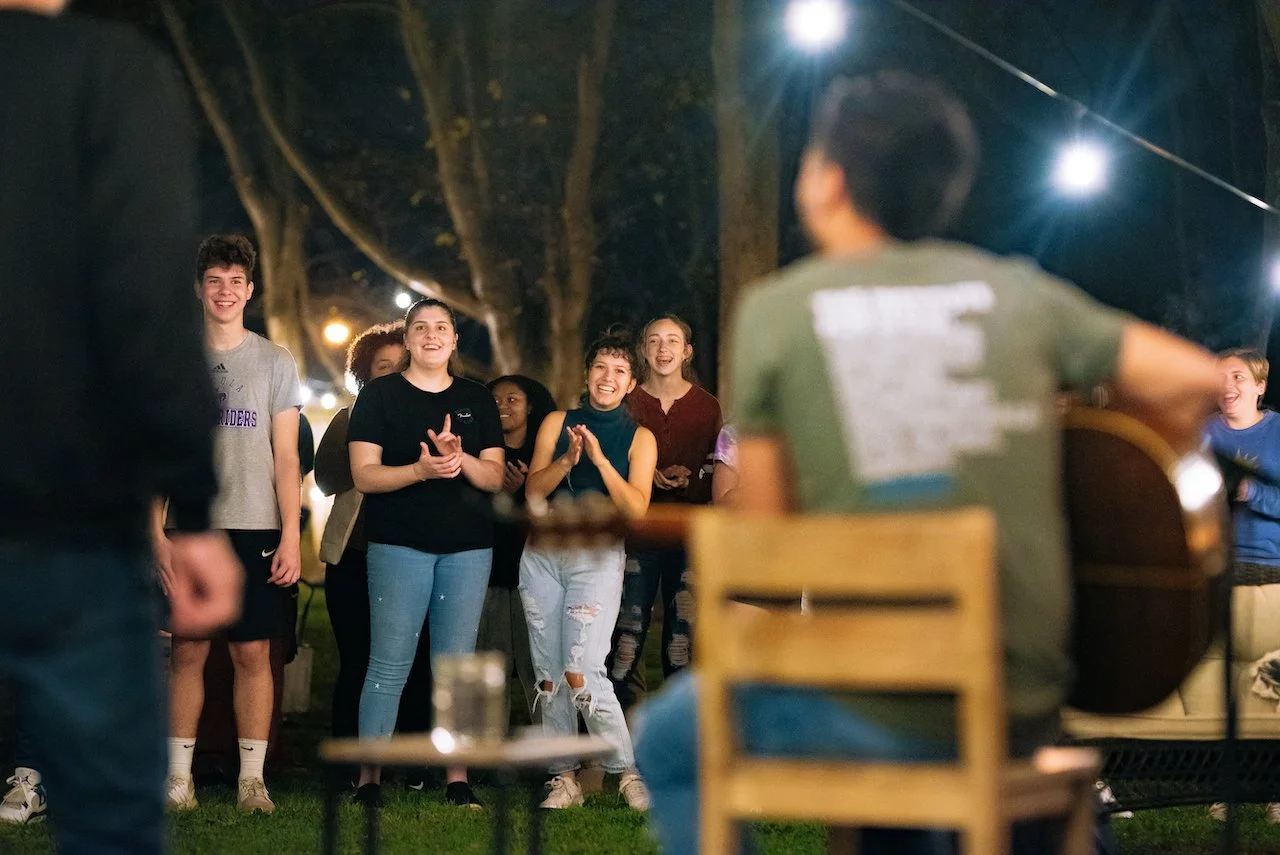Virtual Worship is not the same. Why Christians should keep gathering post-COVID.
Institute President Gregg Garner leads the student body in an outdoor worship set during a fall preview event.
Yes, we’re thankful for technology.
During COVID, many worship times were canceled, postponed, restricted, and reformatted. This sudden and frightening interruption of our bodied gatherings of worship was met with technological solutions for which we can and must thank God. The writer of Ecclesiastes might never have guessed the possibility of digital "gatherings" with hundred and even thousands of attendees when he wrote, "there is nothing new under the sun" (Ecc. 1:9-10). It's phenomenal, and yet, we must admit, it’s also sub-par. Insufficient. Just not quite enough.
And it’s not hard to say generally why. God said it first — like the relational God he is — that “it's not good for man to be alone” (Genesis 2:18). And we can be quite certain God did not then create a 2-dimensional companion to share the same ideas with. Rather, for a body, God made a body. And just as God brought Adam and Eve together to bear the fruit of godly offspring (Genesis 1:28; Malachi 2:15), so also God has brought us together by the Spirit of Jesus in order to bear the fruit of good works (Ephesians 2:10; Romans 12; 1 Corinthians 12). What do I mean? We cannot get away from the need for others and our need to be in the company of others; and to let the world know we belong to one another for God, and our bodies and resources presented to God.
COVID has in some sense forced new digital forms of worship and attendance.While helpful as temporary measures to ensure our hearing of the Word took place for the people of God, it’s important to reaffirm again the intention for bodied gatherings of worship to our God and for study of his Word.
Starting a semester or ending one, starting the day with chapel or ending with prayer, worship is a common communal practice at The Institute, and we’re happy about it.
Worship is a Public Spectacle
When God had Moses confront Pharaoh, this is the reason God gave to Moses and Aaron: “so that they may celebrate a festival to me in the wilderness” (5:1. Also Ex 3:18). Worship. That's right, a large group of people worshiping God is the reason for the exodus. And the assurance God gave Moses even before he went to Egypt was this: “I will be with you…and when you have brought the people out of Egypt, you all will worship God on this mountain.” (Ex 3:12). Worship again. A whole nation gathered together at one mountain, for the one God.
These people were to make their way out of Egypt in order to gather together to praise the God who brought them freedom. To Pharaoh, this was not a good use of his laborers’ time. There are bricks to be made. And yet to God, he was taking for himself a people, a family -- to use New Testament terms a body of Christ -- whose continued relationship with that God is characterized by a coming together for worship (the temple became central in the rhythm of Israel’s life with God, and Jesus and Paul both had as their ‘custom’ to attend the weekly sabbath gatherings. Luke 4:16; Acts 17:2).
Recently, our on-campus church gathered for an annual “summer kick-off.” We shared a meal together, heard about all of the various ministry opportunities happening through the ministry of Global Outreach Developments International this summer, and prayed together.
We all must acknowledge what we are doing in the world when we gather to worship. When we gather in worship, we take a public stance for God in the world. By "not forsaking the fellowship of believers" (Hebrews 10:25), we show that in belonging to God, we have come to belong to one another. And as Jesus sat around the table with his friends and students to eat, sing songs, offer teaching, and pray, Jesus prayed just that - “father, may they be one as you and I are one” (John 17: 22-23). This was not a metaphor for some vague ‘spiritual’ unity. He expected there to be continued social life together because of him, and even gave ways for issues to be dealt with by the community (Matthew 18:15-22).
But being a public spectacle, as God’s people/family/body in Jesus name, is not just a spiritual or theological set of values we share, an idea we hold in common. It is also a physical and material spectacle, something seen and experienced. We don’t just worship God with our hearts and spirits, but together with our bodies and our stuff as well. Just as the power of the wind is signaled in the movement of the trees, so the spirit of the living God is made visible in the mobilizing of our bodies.
Worship is not “just mental,” or “a heart matter,” though it is both of those things. Scripture tells us to worship God with all of our heart, soul, mind, and strength — it is a full body experience designed to happen in the presence of a believing community.
Worship is Physical and Material
Sometimes we can forget that our worship of God is just as physical and material as it is spiritual. What would it have looked like if Moses came to Pharaoh and told him, “let my people worship the LORD God in their hearts, but their strength and resources belong to you”? A different story altogether would have happened. Israel would still be building Pharaoh’s cities, storehouses and pyramids (Exodus 1:11-14). But God demanded the release of a people, his people, and this had an economic impact on Pharaoh that he did not like. Loyalty to God meant that God, and not Pharaoh, would get the goods of a people and their stuff. Neither God nor Pharaoh were looking for a people’s heart alone, but also for their lives and strength (Deuteronomy 6:4-9).
God gave us bodies, and he blesses us with a physical environment from which we can be satisfied and nourished (Genesis 2:8-9). He equips us with skill and wisdom to make great use of the resources of God’s world. With that in mind, we are not just called to feel thankful, but we are called to be mobilized by gratitude to the God who gives good gifts to his children.
When Israel came to worship, they would travel from locations near and far, and they would bring not just themselves and their heart for the Lord, but they would also bring their stuff. If you were well-off, bring an ox. If you were not so well-off, bring a dove or some grain (Leviticus 1 shows how God shows no partiality to the well-off or poor). They would bring their sacrifices, receive the benefits of priestly knowledge and service and share a meal! Consider Deuteronomy 12:5-8. Upon a close reading we can see these several elements at play: v5, a location to meet at where God’s reputation is present (‘name’ in Hebrew refers more to the substance of a name, rather than just the name itself, hence “reputation”); v6, bring your stuff to share; v7a, share meal together in the presence of God; v7b rejoice together “in all the undertakings in which the Lord you God, has blessed you”.
It’s not good for man — or woman — to be alone. The COVID experience was an isolating one. As Christians, we need to listen to the book of Hebrews which tells us to “not forsake the fellowship of believers” — even now.
We are God’s people, and most visibly when gathered together in his presence, sharing our resources together and rejoicing in the blessing of God. Especially connected to sharing a meal together (Exodus 24:9-11; Isaiah 25:6; Matthew 8:11; 22:1-14; Revelation 3:20).
As people of the New Covenant in Jesus name we are no longer subject to the same ordinances and statutes for animal sacrifice in our worship, nor are we bound to a ‘place’ of worship like the temple (John 4:21-24). It is not the place that is important, but the people; and it's not what stuff we bring to God, but who we are together with God (Micah 6:6-8). And as God’s people we are bound to one another, members of one another, because of the Lord Jesus and the unity of His Spirit (Romans 12:5). And the sharing of faith in Jesus leads us naturally to the sharing of space and resources, to the glory of God - this is worship (think of these two stories in that manner, Luke 5:27-29; Acts 16:33-34). When we come to believe in Jesus, we come together as family - spiritually and physically, because we are irreducibly both, and both for God, in Jesus name and in the power of his Spirit.
The points I’ve raised are not complicated but central to the formation of a people for God. We use our bodies to worship God, not just our spirit and heart; to do one to the neglect of the other is to err both ways, because we are both. The solution of virtual attendance during COVID cannot be an enduring trend for us. We need to experience the Spirit of God in the presence of one another. We need to be moved by the sight of hands raised in worship to God. We need to let our rejoicing be heard for the God who gives good gifts to us, his chosen stewards. Worship is not for spectating. Its fruit is found in the corporate experience of shared gratitude and worship, in the power of the Spirit. So bring yourselves, take confidence that your presence with other believers in worship is the dwelling place God is looking for (Ephasians 2:19-22)!





